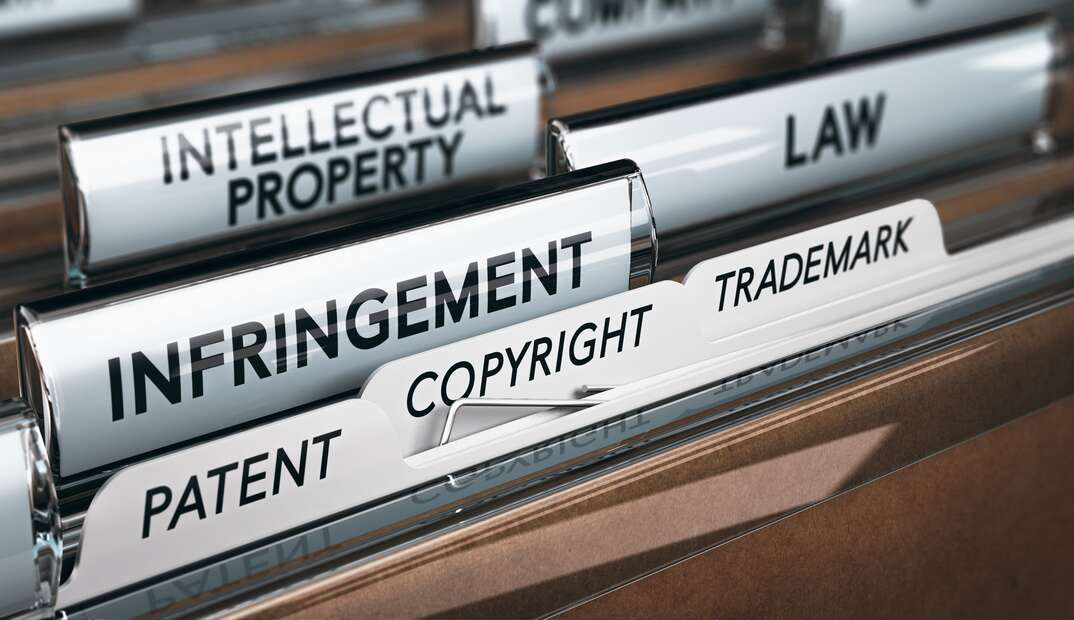How to Handle Copyright or Trademark Infringement

Reviewed by Carina Jenkins, J.D.
Copyright and trademark are two legal principles that are designed to protect types of intellectual property. Copyright is used for creative works, such as novels, movies or paintings. Trademark is used for logos and other symbols associated with a business. Although slightly different, both trademark and copyright ensure you're the person who controls what happens to your property.
Copyright and trademark infringement happen when someone intentionally or unintentionally uses your property. Here are the steps you can take to keep your creative work in your hands.
What Is Copyright?
Copyright is a set of exclusive rights held by the owner of a creative piece of work, including the right to:
- Prepare derivative works, such as a sequel
- Distribute copies to the public by sale, lease or other transfer
- Perform the work publicly through digital transmission, movies or other audiovisual works
- Display the work publicly, including using images in a movie or audiovisual work
Essentially, this means that if you're the owner of a copyright, you have to give permission for your work to be sold, distributed or used publicly.
It's important to note that not all works can be copyrighted. To be copyrighted, a creation must be:
- Original: Made by you with some level of creativity
- Fixed: Preserved in a tangible medium of expression, such as a sculpture, writing or recording
Some types of material can never be copyrighted, including procedures, ideas and discoveries.
What Is Copyright Infringement?
Copyright infringement occurs when someone reproduces, performs, displays, distributes or makes a derivative work without the permission of the copyright owner. However, there are exceptions in the law. Fair use allows excerpts of copyrighted material to be reproduced for criticism, news reporting and research. Education exemptions sometimes allow works to be shared for educational purposes.
Works don't need to be registered to be protected by copyright. However, lawsuits can only be filed regarding registered IP.
A trademark is a symbol, word or words that are legally registered and used to represent a company or product. This can include logos, brand names, slogans or even colors. Generally, trademarks have to be registered with the U.S. Patent and Trademark Office.
What Is Trademark Infringement?
A trademark infringement is the unauthorized use of a trademark in a manner that will cause confusion or deception about where goods or products are coming from. This is an important distinction when compared to copyright law, as there has to be a chance that people will confuse your business and the infringer's business. For example, judges are unlikely to see trademark infringement between Sigma Plumbing and Sigma Dog Food, as clients won't buy from a dog food company and expect to get a plumber.
Your trademark claim is likely to be weaker if you don't use a trademarked logo or if you don't regularly monitor your trademark to make sure people aren't using it.
More Related Articles:
- When Do You Need a Lawyer? Determine If You Need to Hire an Attorney
- How Much Are Court Costs?
- What Is a Misdemeanor?
- What Is Legal Precedent?
- How Do You Fire Your Attorney?
What Do You Do If You’re a Victim of Copyright or Trademark Infringement?
What you choose to do often depends on what work has been copyrighted or trademarked and the value of the intellectual property. Generally, these are the steps you should take:
Step 1: Contact the Infringer
It's possible that this is an oversight. Pointing out to the person that they're infringing on your copyright or trademark may lead to an apology and the work being removed.
Step 2: Talk to the Host
The Digital Millennium Copyright Act (DMCA) covers copyrighted materials that are hosted digitally. It includes a process for copyright owners to request their works be taken down by websites or internet service providers by filing a DMCA takedown notice. Note that the DMCA doesn’t cover trademarks, but many large sites, such as Amazon and Facebook, have policies about infringing on IP rights and procedures for taking infringing works down.
Step 3: Talk to an Attorney
If you're not having any luck by yourself or wish to pursue damages, talking to an attorney is the next step. They'll be able to advise you and take action on your behalf.
Step 4: Send a Cease-and-Desist Letter
This is a formal letter that tells the infringer they're committing an illegal act, and you'll take legal action if they don't stop. It can be sent by an attorney, but there are also templates that can be found online. If the issue escalates to a lawsuit, this letter shows that the person was aware of your infringement claim. In some cases, this letter is required before the court will allow an IP lawsuit.
Step 5: File a Lawsuit
If nothing else works, you can file a lawsuit. Civil suits can provide different types of remedies, including injunctions, monetary damages and the destruction of infringing material. This can be a long and complicated process, so it's important to work closely with your attorney.
Elocal Editorial Content is for educational and entertainment purposes only. The information provided on this site is not legal advice, and no attorney-client or confidential relationship is formed by use of the Editorial Content. We are not a law firm or a substitute for an attorney or law firm. We cannot provide advice, explanation, opinion, or recommendation about possible legal rights, remedies, defenses, options or strategies. The opinions, beliefs and viewpoints expressed by the eLocal Editorial Team and other third-party content providers do not necessarily reflect the opinions, beliefs and viewpoints of eLocal or its affiliate companies. Use of the Blog is subject to the
Website Terms and Conditions.The eLocal Editorial Team operates independently of eLocal USA's marketing and sales decisions.



